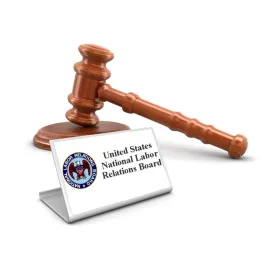As the NLRB continues to navigate the uncertainty in the work landscape during the ongoing COVID-19 pandemic, it seems to have stayed largely on course, regularly issuing decisions touching on a number of important topics under the Act. One such important topic that the Board has devoted recent attention to has been the issue of unionized employers’ unilateral actions. We have discussed previously how the Board abandoned the “clear and unmistakable” waiver standard in favor of the “contract coverage standard.
The Board recently addressed the issue of whether a unilateral change actually occurred in Huron Valley-Sinai Hospital, 369 NLRB No. 64 (April 28, 2020).
Factual Background
The union was certified as the exclusive bargaining representative for all full-time and regular part-time registered nurses at the employer’s acute care hospital in 2016. The union and the employer engaged in collective bargaining starting in 2016 and reached a collective bargaining agreement in 2018. During this period of collective bargaining, the union filed a number of unfair labor practice charges against the employer.
One allegation was that the employer changed its meal and break program. The nature of the allegation stemmed from a request by the union to see the break policy. The human resources representative mistakenly sent a corporate policy that stated violations of the policy could subject employees to discipline or discharge. The actual policy in place at the facility contained no such language about discipline. The human resources representative immediately realized a mistake had been made and sent the union an email stating there was a mistake and attaching the correct policy. The human resources representative also followed up with additional emails when she did not hear back from the union.
Despite this background, the NLRB Region issued a complaint asserting that the employer implemented a new break policy.
After a hearing on the charges, the Administrative Law Judge found that the employer engaged in several unfair labor practices, a number of which stemmed from the employer’s unilateral actions impacting terms and conditions of employment without first giving the union notice and an opportunity to bargain. As part of the case, the ALJ found that the employer had implemented a new break policy without bargaining with the union.
Specifically, the ALJ found that the employer’s parent company developed and implemented a new meal and rest break policy, without first notifying and discussing with the union, while the employer and the union were in negotiations for their first collective bargaining agreement. The policy included provisions that resembled the policy the employer had in place since 2014, but it added a provision announcing the possibility of discipline for the repeated missing of meals without prior approval by the department manager. The ALJ found that the parent company’s new meal and rest break policy applied to unit bargaining employees and thereby constituted a unilateral change in terms and conditions of employment in violation of the Act.
The employer appealed.
Analysis
On review, the Board found that the parent company’s meal and rest break policy did not apply to unit employees because the union was informed in writing by the employer that no changes had been made to the break policy governing unit employees. Uncontroverted testimonial and documentary evidence presented at the hearing, yet apparently not considered at trial, showed that the employer’s chief human resources officer accidentally sent the union a copy of the parent company’s new meal and rest break policy when the union requested a copy of the employer’s current break policy. After the mistake was noticed, the human resources officer followed up with the union via email noting her mistake and sending the 2014 policy, which she clarified was still in effect for unit employees. Receiving no response from the union, the employer sent a few follow up emails assuring the union that no changes had been made to the status quo for the unit employees, that the parent company’s 2018 policy applied to non-union employees only, and that the employer was continuing to apply its 2014 break policy to the union employees.
Reviewing this documentary evidence and citing the lack of evidence that the employer had implemented or applied the parent company’s 2018 break policy to bargaining unit employees, the Board held that the employer did not unilaterally change its meal and rest break policy in violation of the Act. The human resources officer’s error in sending the union the wrong policy did not effect a change in the employer’s policy for its union employees, especially where the officer corrected her error promptly. Finding that the employer did not unilaterally change the unit employees’ terms and conditions of employment, the Board dismissed this allegation.
Takeaways
This is one of those cases that is not likely to repeat itself often. The evidence apparently was undisputed: no change to employee terms and conditions had occurred. While the union was sent the wrong policy – one that looked like a change had occurred – the mistake was corrected immediately and in writing. Despite this, the union filed a charge over the issue and a violation was found on only part of the story.
It is scary that a violation of the law can be found when there exists evidence that completely refutes it. The fact that the employer had been under scrutiny for its dealings with the union likely did not help.
The main takeaway here is that it is always good practice to document, document, document, all interactions that have potential legal ramifications. Here, the employer was responding to an information request from the union. The union took the information (the mistaken policy) and used it to support an unfair labor practice allegation. The employer ultimately was able to defeat the allegation by showing documents that refuted the allegation. Had the human resources representative not corrected the mistake in writing, then the issue would be one of credibility; it would have been much more difficult to defeat the charge without documentation. Also, the fact that the human resources representative followed up with additional emails when the union did not acknowledge the mistake had been corrected was very helpful. This is not a sweeping legal decision but it does reinforce the notion that good practices, such as documentation and recordkeeping, can go a long way in avoiding legal disputes.




 />i
/>i

